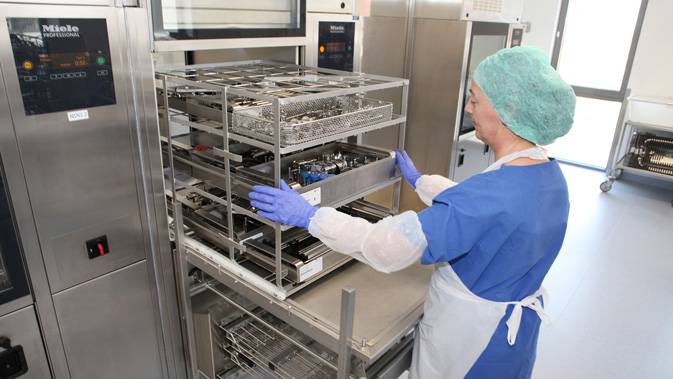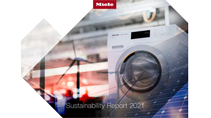Press releases
daVinci Xi robotic instruments - Miele reprocessing successfully validated

St. Antonius Hospital in Gronau inaugurates new CSSD
Germany's first clinic, the St. Antonius Hospital in the Westphalian town of Gronau, has been using the daVinci Xi robotic-assisted operation system since autumn 2014. Robotic-assisted instruments were reprocessed in a machine-based environment right from the outset. And now, the ROBOTVARIO X-tra reprocessing system from Miele Professional has been validated in Germany for the first time.
With a total of four daVinci theatre robot systems, this hospital is an international leader with respect to this innovative operation technology, which has been in use in Gronau since 2006. This process considerably reduces the risks to patients thanks to the degree of precision it offers. At the St. Antonius Hospital, this technology has already been used in around 7500 operations. Unique throughout Europe is the Center for Robotic Medicine (CRM) under the auspices of which robotic-assisted surgery is used in urology, gynaecology and general surgery. The need for a wide range of different instruments is correspondingly high. With its ten clinics, the St. Antonius Hospital treats around 14,000 inpatients and 40,000 outpatients each year.
'The highly sensitive reprocessing of medical products is hardly conceivable nowadays without a fair share of machine-based reprocessing', says Mechthild Schulze-Buschhoff. She manages the new central sterile supplies department (CSSD) which was opened in March. This centre covers 270 m² offering ample space for technical equipment – in close proximity to the central theatre wing. The unit deploys four PG 8528 large-chamber decontamination units.
Two of these four units are dedicated to washing and disinfecting above all daVinci instruments using load carriers for the current generation of robotic-assisted instruments (daVinci Si) as well as new modular units specifically designed for the new Xi instruments.
On all these load carriers, two connections each for a total of eight instruments ensure that the shaft and the casing are irrigated separately.
This aspect of reprocessing takes approximately 45 minutes and follows a manual pre-cleaning phase. The ROBOTVARIO X-tra programme has now been successfully validated on the large-chamber decontamination units. This involved a comprehensive set of quality checks after the final stage of reprocessing.
At the end of each cleaning cycle, all instruments are first checked and their functionality tested. They are then placed in containers or special-purpose trays in readiness for sterilisation. The bulk of daVinci instruments are sterilised in the new autoclaves. The thermally sensitive daVinci fibre optics, however, must be reprocessed in a plasma steriliser which ensures freedom from microbes in a particularly short space of time. The entire reprocessing cycle is recorded throughout by an electronic documentation system.
The new CSSD in Gronau is currently built to process 33,000 sterile supply units per year but space for further equipment was included when the new premises were still at the planning stage. 'We can respond fast to increases in demand and can react flexibly without any major changes to the fabric of the building', explains the managing director Ludger Vormann. After all, in terms of patient safety, hygiene is a decisive factor – alongside the qualification of medical and care staff.
(520 words, 3.474 characters incl. spaces)
St. Antonius Hospital and the Center for Robotic Medicine (CRM) in Gronau: The St. Antonius Hospital Gronau GmbH is a hospital providing a full range of healthcare services which also operates various in- and outpatient care and nursing institutions. The St. Antonius Hospital - a teaching hospital affiliated to the Westphalian Wilhelms University in Münster, provides care in its ten clinics to more than 14,000 inpatients and around 40,000 outpatients per year. Various clinics affiliated to the St. Antonius Hospital in Gronau collaborate under the auspices of the Center for Robotic Medicine (CRM). Supported by the latest robotic-assisted systems, around 1200 general, gynaecological and urological operations are performed. The CRM leads the field in Europe, with three installations in clinical use and a further system for training. This cross-clinic deployment in combination with joint quality and further training goals is virtually unique in both Germany and Europe. The European Robotic Institute (ERI) further complements the scope of the CRM in Gronau as a centre for studies and further education. The St. Antonius Hospital in Gronau first introduced da Vinci® technology in 2006 and has since performed operations on more than 7,500 patients from the whole of Germany and abroad. The benefits: Gentle and highly precise, fewer complications, lower risk of infection, protects nerve matter, less blood loss, less pain, faster recovery, shorter hospital stays.
Miele company profile: Miele is the world's leading manufacturer of premium domestic appliances including cooking, baking and steam-cooking appliances, refrigeration products, coffee makers, dishwashers and laundry and floor care products. This line-up is augmented by dishwashers, washer-extractors and tumble dryers for commercial use as well as washer-disinfectors and sterilisers for use in medical and laboratory applications (Miele Professional). The Miele company, founded in 1899, has 8 production plants in Germany as well as one plant each in Austria, the Czech Republic, China and Romania. 2013/14 turnover amounted to approx. EUR 3.22 bn with sales outside Germany accounting for 70%. Miele is represented with its own sales subsidiaries and via importers in almost 100 countries. The Miele company, now in the fourth generation of family ownership, employs a workforce of around 17,660, 10,411 thereof in Germany. The company headquarters are located in Gütersloh/Westphalia, Germany.
Anke Schläger
+ 49 5241 89-1949
anke.schlaeger@miele.com
Media information
| Description | Download |
|---|---|

Ample space has been allocated to the CSSD at the St. Antonius Hospital, Gronau. The facility now covers an area of 270 m². (Photo: St. Antonius Hospital, Gronau) |
High Resolution TIFF |
| High Resolution JPG | |

Equipped with the latest technology: Four large-chamber decontamination units from Miele Professional are deployed in the new CSSD. (Photo: St. Antonius Hospital, Gronau) |
High Resolution TIFF |
| High Resolution JPG | |

Loading of a modular load carrier for the reprocessing of the new robotic-assisted daVinci Si operation system. The ROBOTVARIO X-tra reprocessing system has now been validated in Germany for the first time. (Photo: St. Antonius Hospital, Gronau) |
High Resolution TIFF |
| High Resolution JPG | |

Highly sensitive medical products: Shafted instruments and accessories for the daVinci Xi operation system. (Photo: St. Antonius Hospital, Gronau) |
High Resolution TIFF |
| High Resolution JPG | |

Successful reprocessing proven: Cycle documentation at St. Antonius Hospital. (Photo: St. Antonius Hospital, Gronau) |
High Resolution TIFF |
| High Resolution JPG |


